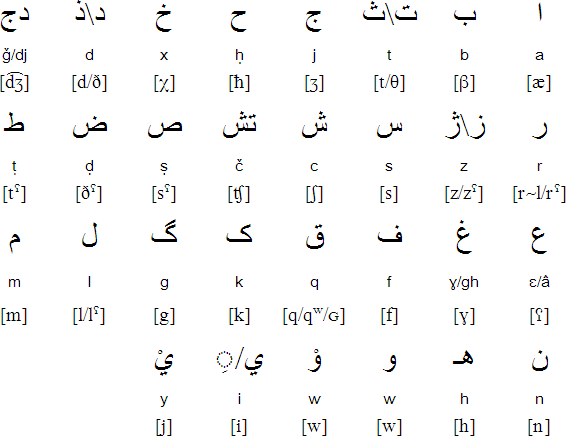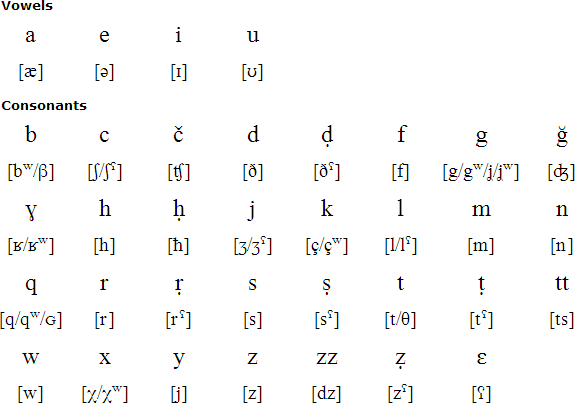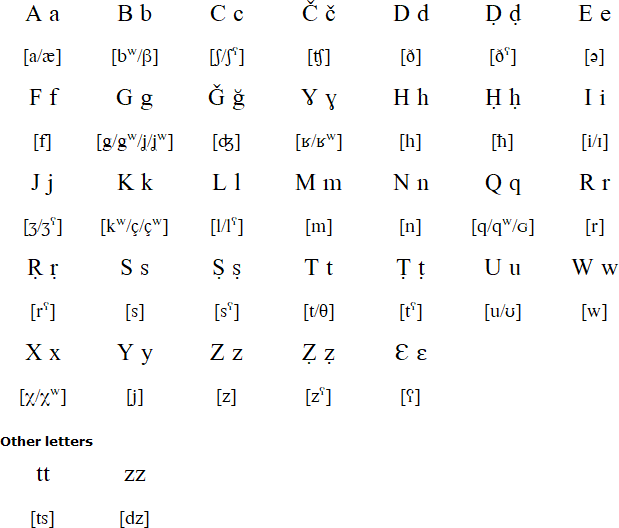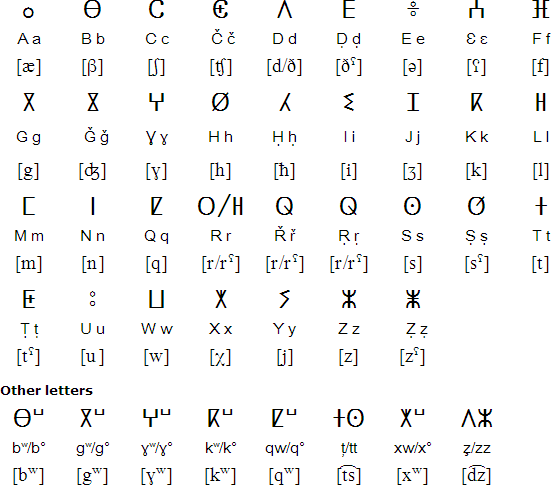Kabyle is a Berber language with about 7-8 million speakers, most of whom live in Algeria, mainly in Kabylie in the north of the country. There are also some Kabyle speakers in France, Belgium, the USA and a number of other countries.
Kabyle was written with the Tifinagh alphabet until the 6th century, when Latin became the official and administrative language of North Africa. The Arabic script was sometimes used, although only by Muslim clerics in religious schools. In the 18th century, a French ethnologist devised a way of writing the language with the Latin alphabet, based on French spelling. He published the first French-Kabyle dictionary.
After 1962, when Algeria became independent, some Kabyle activists tried to bring the Tifinagh script back into use for Kabyle. They modernised the script by changing some of the letters and adding vowels. They met with little success, and Tifinagh is used mainly for decorative purposes in Algeria.
Nowadays, Kabyle is generally written with the Latin alphabet using an orthography devised by Mouloud Mammeri (1917-1989), a Algerian writer, anthropologist and linguist. In 1996, a unifed alphabet for northern varieties of Berber, including Kabyle, was created at a workshop organized by l'institut national des langues et civilisations orientales (Inalco).
Kabyle has no official status in Algeria, but there some radio and TV programmes in the language, and it is taught in schools in Kabyle speaking areas.




Download an alphabet chart for Kabyle (Excel)
ⵉⵎⴷⴰⵏⴻⵏ ⴰⴽⴽⴻⵏ ⵎⴰ ⵍⵍⴰⵏ ⵜⵙⵍⴰⵍⴻⵏ-ⴷ ⴷ ⵉⵍⴻⵍⵍⵉⵢⴻⵏ ⴳⴷⴰⵏ ⴷⴻⴳ ⵍⵃⴻⵕⵎⴰ ⴷ ⵢⵉⵣⴻⵔⴼⴰⵏ, ⵖⵓⵔ-ⵙⴻⵏ ⵍⴻⵄⵇⴻⵍ ⴷ ⵜⴻⴼⵔⵉⵜ, ⵢⴻⵙⵙⴻⴼⴽ ⴰⴷ ⵜⵉⵍⵉ ⵜⴻⴳⵎⴰⵜ ⴳⴰⵔ-ⴰⵙⴻⵏ.
Imdanen akken ma llan ttlalen-d d ilelliyen gdan deg lḥeṛma d yizerfan, ɣur-sen leɛqel d tefrit, yessefk ad tili tegmat gar-asen.
All human beings are born free and equal in dignity and rights. They are endowed with reason and conscience and should act towards one another in a spirit of brotherhood.
(Article 1 of the Universal Declaration of Human Rights)
Information about Kabyle | Phrases | Numbers
Information about the Kabyle language
http://en.wikipedia.org/wiki/Kabyle_language
https://en.wikipedia.org/wiki/Berber_Latin_alphabet
http://www.rosettaproject.org/archive/kab/
Ancient Berber, Ghadamès, Ghomara, Guanche, Kabyle, Riffian, Shilha (Tashelhit), Shawiya, Shenwa, Siwi, Tamahaq, Tamasheq, Tamazight, Tawallammat Tamajaq, Tayart Tamajeq, Zenaga, Zuwara Berber
Kabyle, Riffian, Shilha (Tashelhit), Siwi, Tamasheq, Tamazight, Tayart Tamajeq
Adamaua Fulfulde, Afrikaans, Arabic (Algerian), Arabic (Bedawi), Arabic (Chadian), Arabic (Egyptian), Arabic (Gulf), Arabic (Hassaniya), Arabic (Hejazi), Arabic (Lebanese), Arabic (Libyan), Arabic (Modern Standard), Arabic (Moroccan), Arabic (Najdi), Arabic (Sudanese), Arabic (Syrian), Arabic (Tunisian), Arwi, Äynu, Azeri, Balanta-Ganja, Balti, Baluchi, Beja, Belarusian, Bosnian, Brahui, Chagatai, Chechen, Chittagonian, Comorian, Crimean Tatar, Dargwa, Dari, Dhatki, Dogri, Domari, Gawar Bati, Gawri, Gilaki, Hausa, Hazaragi, Hindko, Indus Kohistani, Kabyle, Kalkoti, Karakalpak, Kashmiri, Kazakh, Khowar, Khorasani Turkic, Khwarezmian, Konkani, Kumzari, Kurdish, Kyrgyz, Lezgi, Lop, Luri, Maguindanao, Malay, Malay (Terengganu), Mandinka, Marwari, Mazandarani, Mogholi, Morisco, Mozarabic, Munji, Noakhailla, Nubi, Ormuri, Palula, Parkari Koli, Pashto, Persian/Farsi, Punjabi, Qashqai, Rajasthani, Rohingya, Salar, Saraiki, Sawi, Serer, Shabaki, Shina, Shughni, Sindhi, Somali, Soninke, Tatar, Tausūg, Tawallammat Tamajaq, Tayart Tamajeq, Ternate, Torwali, Turkish, Urdu, Uyghur, Uzbek, Wakhi, Wanetsi, Wolof, Xiao'erjing, Yidgha
Languages written with the Latin alphabet
Page last modified: 08.04.25
[top]
You can support this site by Buying Me A Coffee, and if you like what you see on this page, you can use the buttons below to share it with people you know.

If you like this site and find it useful, you can support it by making a donation via PayPal or Patreon, or by contributing in other ways. Omniglot is how I make my living.
Note: all links on this site to Amazon.com, Amazon.co.uk
and Amazon.fr
are affiliate links. This means I earn a commission if you click on any of them and buy something. So by clicking on these links you can help to support this site.
[top]